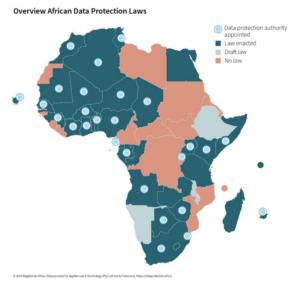In the digital age, data has become one of the most valuable assets for both individuals and organizations. With the surge of cloud computing, AI, and big data, data flows across borders at an unprecedented rate. However, as data crosses geographical boundaries, concerns about data sovereignty and security emerge, especially in regions like Africa, where the balance between innovation and data protection is delicate. This blog explores the concept of data sovereignty in Africa, discusses the growing push for data localization laws, and proposes frameworks for compliance that can help African nations protect their citizens’ data without stifling innovation.
What is Data Sovereignty?
Data sovereignty refers to the concept that digital data is subject to the laws and governance structures of the country where it is collected or processed. This means that governments have jurisdiction over data within their borders and can enforce policies regarding how that data is stored, accessed, and used. For many African countries, data sovereignty is an emerging area of focus as data becomes a critical asset for national security, economic development, and privacy protection.
The Rise of Data Localization Laws in Africa
To strengthen data sovereignty, several African countries have implemented or proposed data localization laws that require certain types of data, especially personal data, to be stored within national borders. Countries like Nigeria, Kenya, and South Africa have introduced or are considering regulations that mandate data to be processed and stored domestically to protect citizens’ privacy and reduce dependence on foreign data infrastructure.

Megatrends Afrika (2024) – Overview of African Data Protection Laws
For instance, Nigeria’s National Information Technology Development Agency (NITDA) guidelines require local storage of critical data to ensure national security and boost local data infrastructure. Similarly, Kenya’s Data Protection Act emphasizes the need for data collected in the country to be managed under Kenyan jurisdiction. These regulations aim to protect citizens’ data from foreign exploitation and ensure that data generated locally contributes to the national economy.
However, while these regulations seek to safeguard data, they also introduce challenges for organizations operating in Africa. Data localization laws can create hurdles for cross-border data transfer, complicating data management for multinational companies and potentially limiting access to global technologies and innovations.
Privacy Concerns and the Role of Compliance
Data localization is not just about physical storage but also about privacy. With the rise of AI and big data, there is growing concern that personal data could be used without consent, leading to potential privacy violations. African citizens are becoming increasingly aware of their privacy rights, urging companies and governments alike to take stronger measures to protect personal data.
Compliance frameworks such as the General Data Protection Regulation (GDPR) in Europe have set global standards for data privacy, influencing African legislation as well. Many African countries are now enacting data protection laws modeled on GDPR, emphasizing the importance of consent, transparency, and data minimization. These frameworks can serve as useful benchmarks for African nations to create robust data protection policies that respect citizens’ privacy without limiting the potential for innovation.
A Framework for Balancing Innovation with Data Protection
For Africa to thrive in the digital economy, a balanced approach to data sovereignty is essential. Here are some proposed strategies for creating a framework that supports data protection while fostering innovation:
- Create Regional Data Governance Standards: Africa can benefit from a unified data and AI governance framework that harmonizes data protection laws across countries. By establishing regional standards, African nations can ensure data interoperability, simplify compliance for organizations, and enable cross-border collaboration.
- Support Local Data Infrastructure Development: Investing in local data centers and cloud infrastructure can help African countries comply with data localization requirements while reducing reliance on foreign services. This investment not only enhances data sovereignty but also stimulates economic growth by creating jobs in technology and data management.
- Implement Privacy-by-Design Principles: Privacy should be embedded into data systems and processes from the outset. By adopting privacy-by-design principles, organizations can ensure that data protection is an integral part of their operations, reducing the risk of breaches and fostering trust with customers.
- Encourage Public-Private Collaboration: Governments and private sector companies, including tech and AI firms like CipherSense, should collaborate to develop data policies that support innovation while respecting data sovereignty. Collaborative frameworks enable stakeholders to share best practices and build compliance mechanisms that are practical and effective.
- Build Awareness Among Citizens: Empowering citizens with knowledge about their data rights and privacy is essential. Governments, organizations, and advocacy groups should work together to educate the public on data protection issues, fostering a data-conscious society that values privacy and holds companies accountable.
CipherSense: A Privacy-Conscious Leader
At CipherSense, we recognize the importance of data sovereignty and are committed to upholding privacy and data protection standards in Africa. Our approach to AI is rooted in local context and prioritizes data privacy by embedding compliance into every layer of our data and AI infrastructure.
CipherSense’s architecture includes built-in data governance features that enable organizations to manage data securely and responsibly. Our model not only respects national data laws but also leverages Africa-specific insights to create AI solutions that reflect the values and needs of African communities. By leveraging advanced encryption techniques and privacy-enhancing technologies, CipherSense enables organizations to:
- Secure sensitive data: Protect sensitive information from unauthorized access and breaches.
- Comply with regulations: Adhere to data privacy regulations, such as GDPR and CCPA.
- Build trust with customers: Demonstrate a commitment to privacy and security.
Conclusion
Data sovereignty is a critical issue for Africa as it navigates the digital era. By adopting data localization laws and enhancing privacy protection, African nations can create an environment where innovation thrives without compromising citizens’ rights. Together, we can build a digital future that respects data sovereignty and harnesses the power of data for sustainable development across the continent.

